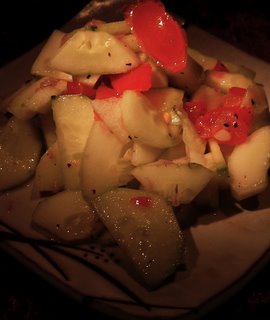
Egyptian Cucumber Salad:
This salad is everywhere in Egypt, and I ate tons of it there and since. It is best with fresh sweet summer cucumbers and ripe red tomatoes, and it is simply dressed in vinegar, lemon juice, salt and plenty of pepper. I have also had it with onions, garlic, green peppers, parsley, sprinkles of cumin or cayanne pepper...
This salad was just cucumber, tomato, garlic, lemon zest and the dressing.
When I told Adrastas of the cucumber bounty, he expressed his love of Egyptian salad and confided that his favorite part was removing the bitter from the cucumbers: Slicing off the end and rubbing the exposed parts together furiously. It seems I had heard something about this, and I must admit that it is fun, but does it work? How does it work? And how do you know it works unless you taste it first and compare? I speculated about the plants protecting themselves against decapitation or insect attack, and then I turned to the internet and found out the following facts (none of which answered my question):
* Cucumbers on the vine really are "cool as a cucumber": Their internal temperature will often be 20 degrees cooler than air temperature.
* Bitterness is prevalent in the dark green skins and the light green sections right under the skins. Bitterness is most often found in the stem end rather than the blossom end.
* Slicing the cucumber thin and soaking in salted ice water is supposed to remove bitterness. Perhaps through osmosis into the saline solution?
* Bitter comes from Cucurbitacin, a chemical that probably developed in the plant as a natural pesticide. So it does kind of make sense that the cucumber might rush this chemical to a bitten or otherwise exposed bit of flesh to deter insects. This chemical is supposedly beneficial and anti-cancer in small doses.
* Burping is supposedly caused by Cucurbitacin, although others claim it is from the seeds. If both are true, then is the bitterness also in the seeds?
To bring it back to the Egyptian Salad, I found this quote from Groser's Scripture Natural History:
We need not altogether wonder that the Israelites, wearily marching through the arid solitudes of the Sinaitic peninsula, thought more of the cucumbers and watermelons of which they had had no lack in Egypt, rather than of the cruel bondage which was the price of these luxuries.



No comments:
Post a Comment